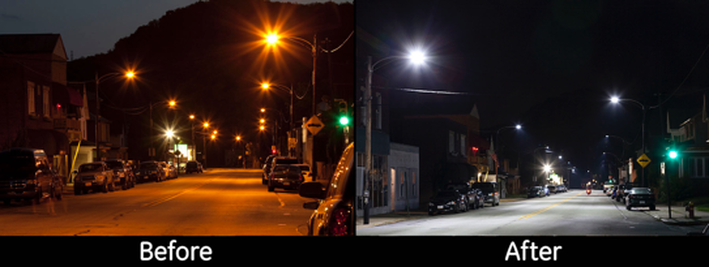
Have you noticed how shockingly bright streetlights are these days? Although they’re great for night time visibility, the newer LED streetlights tamper with the body’s internal clock, skewing metabolic function and raising disease risk.
The effect of blue-rich white light at night on human health is so significant that the American Medical Association (AMA) issued a policy statement about street lighting.
It warns LED street lights are five times more disruptive to the human sleep cycle than traditional street lighting and that recent large surveys link brighter residential lighting with reduced sleep, poor functioning, and more obesity. The lighting also increases the risk of cancer, diabetes, and heart disease.
These bright blue-white lights also strain the eyes and can cause problems walking or driving safely at night. Enough blue light can even damage the retina.
How night time lighting can be safer for health
LED lights were introduced because they consume less energy. The AMA suggests ways to make the lighting friendlier to human biology (and that of area wildlife):
- Lowering the color temperature of the lights away from the blue end of the spectrum (which signals the brain it is daytime) and towards the orange end of the spectrum. Current lights have a color temperature of 4000K to 5000K. Compare this with the use of fire and candles human have used for most of history, at 1800K. The AMA recommends lights be no bluer than 3000K.
- Better shielding the light to reduce eye-straining glare.
- Using adaptive controls to dim or extinguish the lights.
You don’t have to understand the science to feel the effects of these lights. Residents in areas where they are installed around the country are complaining, saying the lights feel like a car lot or strip mall parking lot. The LED street lamps also light up the insides of homes, especially in hilly areas such as Seattle. Davis, California residents found them so objectionable the city agreed to replace all existing LED streetlights with more biologically friendly lighting.
Do you need sunglasses at night?
Of course, it’s dangerous to wear dark glasses at night. But that doesn’t mean you don’t have recourse if LED streetlights are a part of your night life.
You can switch the light coming into your eyes to a more biologically friendly hue by wearing orange or rose tinted glasses that aren’t sunglasses. Examples include affordable Uvex safety glasses from Amazon, orange glasses from Low Blue Lights (these glasses are more expensive because they are scratch resistant), or rose tinted migraine glasses.
Also, cities are taking note of complaints, so be sure to add your voice.
Avoid night time blue lights indoors too
LED streetlights aren’t the only culprits when it comes to confusing your sleep-wake cycle. LED televisions, smart phones, tablets, computers, and LED bulbs also bombard you with too much blue light at night, hindering the output of sleep hormones.
Purchasing orange bulbs for lamps, orange filters to put over your screens, or wearing orange glasses a couple of hours before bed are ways to encourage the production of sleep hormones and maintain the delicate but important sleep-wake cycle.

 RSS Feed
RSS Feed